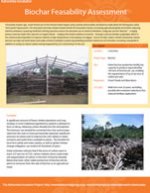Biochar Feasibility Assessment
View PublicationThousands of years ago, South Americans of the Amazon Basin began using charred animal waste and wood to make what the Portuguese called terra preta (black earth). The terra preta soil they created remains fertile for thousands of years, increasing agricultural yields and further reducing harmful emissions caused by inefficient farming practices and/or the excessive use of chemical fertilizers. Today, we call this biochar – a highly porous charcoal made from any form of organic waste – ranging from forest residues to manure – through a process known as pyrolysis, which is the chemical decomposition of organic material at high temperature in the absence of oxygen. Due to its high carbon content and porous nature, biochar can help soil retain water and make nutrients available to plants by providing excellent habitat for soil microbes, increasing crop yields in addition to acting as natural carbon sink by sequestering CO2 and storing it in the soil.

